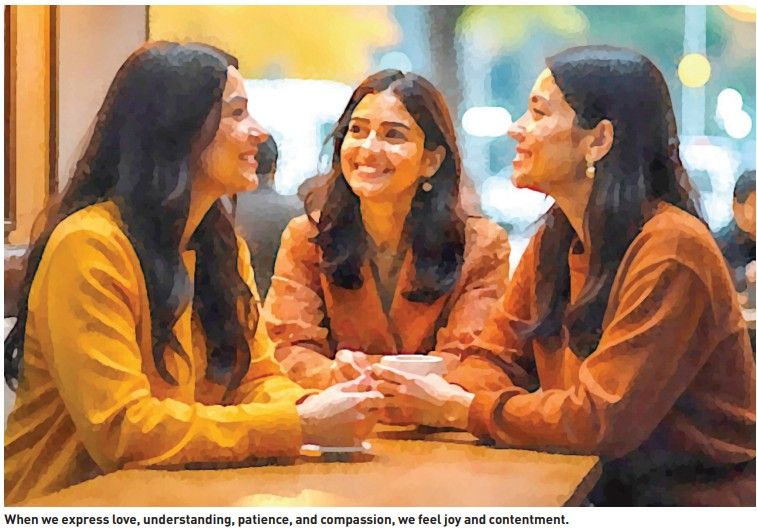By: BK Shivani
Source: The Daily Guardian https://epaper.thedailyguardian.com/view/2880/the-daily-guardian/15
Dated: August 23nd, 2025

Can all people and situations be the way we want? We know that is not possible. Yet we have programmed ourselves to be unhappy when others do not listen to us, or when situations are not to our liking.
Why cannot people think the way I do? Why do they not understand when I say something that is good for them? The reason is that they perceive things differently. That is so because they have repeatedly chosen to see things that way, and it has become their habit. Wondering why someone thinks in a particular way is like asking, “I drink tea; why do you drink coffee?’ The answer is straightforward: it is their choice. The same applies to, “I always speak the truth, why do you lie?” That is because I have repeatedly chosen to speak the truth, and it has become my habit, while the other person is used to lying. In such situations, it is the expectation that others should be like us, which causes problems; the other person is not the problem.
Look at the people around you, those you live or work with - they are all different. Our own children, who have lived with us from the day they were born, turn out to be very different from us. That is because of their internal programming, or ‘sanskars’. We need to remember that everyone functions according to their ‘sanskars’. It is when we forget this that we find other people strange or unpleasant. Someone who is truthful would feel that those who lie are bad, while a person who often tells lies would wonder how anyone could speak the truth all the time. Similarly, someone who trusts easily would feel that those who distrust others are odd, while a born sceptic would wonder how people can trust others readily.
If we do not have a particular ‘sanskar’, we find it strange, and question it. But we need to live and work with people who have different ‘sanskars’. How do we do that without friction? We need to recognize the fact that people are the way they are because of the ideas, attitudes, and beliefs they have formed through their experiences. If we do not do this, we can end up creating negative ‘sanskars’ of our own - of irritation, anger, criticism, and rejection.
We may have often heard or read about the soul. But when we meet people, not once do we remember that they are souls, and that I too am a soul. Each soul is on a journey, which may last several lifetimes, during which it has recorded numerous experiences. We may liken souls to CDs, each with a unique recording on it, so they all play different songs. We can choose to enjoy the medley and get along with each other, but what do we do? We try to change the songs the other CDs are playing; in other words, we try to change others instead of adapting to them.
A CD is liked when it plays the best songs recorded on it. Souls too are valued when they act according to their best ‘sanskars’. While all CDs may have different recordings on them, they have some basic characteristics that are similar – such as their size and shape. It is the same with souls – they all have the same innate qualities, including purity, peace, love, happiness, and truth. But these virtues are rarely expressed, because the other recordings - of worry, anger, fear, dislike - have become predominant over time.
Nowadays people listen to music on their phones. They may have many songs saved on the phone, but they create a playlist, and only the songs on the playlist keep playing in a loop. As souls, we put some ‘sanskars’ on our playlist. For example, when we do not like something about someone, we criticize them. Criticism is on the playlist. When someone fails to do their work properly, we get angry. Anger is on the playlist. These ‘sanskars’ keep playing in a loop.
God reminds us that we have beautiful songs recorded in ourselves. Meditation is sitting down and identifying the beautiful songs I have recorded within myself, and then choosing to play them. Not only will I enjoy the music, so will everyone else who hears it. When the soul expresses love, understanding, patience, and compassion, it feels joy and contentment, because it is in consonance with its original qualities. It is the jarring notes of anger, ego, jealousy, and criticism that cause discomfort and pain.
As we go through our day, we may accidentally play some unpleasant songs, when a wrong ‘sanskar’ is triggered. Never mind. Just change the song, as we do when playing music. Once we start doing this, we gradually reclaim control of our emotions, responses, and our life. Then we will no longer seek happiness, but instead create happiness by being the best we can be.

BK Shivani is a well-known motivational speaker and Rajyoga teacher.



